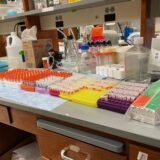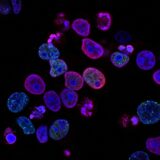![Medicine - Cancer Biology E-Newsletter [Vanderbilt University]](https://cdn.vanderbilt.edu/vu-URL/wp-content/uploads/sites/119/2017/11/19151037/cancer-biology-design-004.png)
|
|
July 2021
|
|

As the new school year approaches, let us start each day with kindness and foster an inclusive, equitable learning environment that encourages diverse ideas and opinions. Take time each day to mentor, protect and lift each other up. Pledge to yourself that each morning is a fresh start and an opportunity to make a difference in someone’s life.
We can all be the change we wish to see in the world. Wherever you go, go with all of your heart. A new day and a beautiful new beginning!
Getting to know you:
Faculty Spotlight:

Bhuminder Singh, PhD
Assistant Professor of Medicine
We are pleased to welcome Dr. Singh as a faculty member in the Program of Cancer Biology! His lab studies receptor tyrosine kinase (RTK) signaling in human health and disease, emphasizing epidermal growth factor receptor (EGFR) signaling. The research may broadly be divided into two areas: 1) Trafficking of EGFR ligands in polarized epithelial cells: Spatial cues to regulate EGFR signaling are best appreciated in three-dimensional (3D) cultures (e.g., Transwell, type I collagen, and Matrigel cultures) as opposed to conventional 2D plastic cultures, where EGFR ligands are delivered and secreted in a polarized manner (apical vs. basolateral trafficking). A primary focus within this area is to understand the loss of epithelial polarity induced by loss of polarized trafficking of the EGFR ligand, epiregulin, and the role of novel epiregulin-interacting proteins in the observed phenotypes. 2) Cetuximab resistance in colorectal cancer: Using 3D cultures of colorectal cancer (CRC) cells, we study novel resistance mechanisms to cetuximab, an FDA-approved EGFR neutralizing monoclonal antibody. We have discovered two non-genetic modes of cetuximab resistance and identified means to overcome this resistance by adding a dual MET/RON RTK inhibitor, crizotinib. We are committed to elucidating the mechanistic underpinnings of this mode of cetuximab resistance, its scope in human CRC, and the therapeutic benefit of combined blockade of EGFR with RTKs, MET and RON.
Trainee Spotlight:

Shawna McLetchie Brookens, PhD
Shawna (Boothby lab) recently defended her PhD dissertation work by examining how metabolism underpins many processes in the field of cellular biology. Many diseases, including cancer, often involve aberrant metabolic pathways with altered reliance on metabolites, metabolic enzymes, or metabolic regulators. B lymphocytes are a good model for studying metabolism because they have multiple differentiation states with dynamic energy and biosynthetic requirements. A metabolic sensor and orchestrator of a plethora of metabolic programs, AMP-activated protein kinase (AMPK), is critical for metabolic adaptation to stressful nutrient-limiting conditions in multiple cell types and settings. In her thesis work, Shawna showed that AMPK is critical for maintaining the memory B cell population by promoting mitochondria homeostasis. AMPK also fine-tunes immunoglobulin synthesis in the antibody-secreting cell population by regulation of mTORC1. In addition, AMPK has been shown to regulate glutamine and glucose metabolism, which are critical fuels for B cell activation, differentiation, and antibody synthesis. The import of glucose and glutamine metabolism synergistically influence B cell biology processes, including somatic hypermutation and class switching. Understanding critical metabolic pathways of the B lineage can lead to therapeutic targets for effective vaccine development and immune pathologies. Shawna’s research was published in the Journal of Immunology, which you can read here, “AMPKa1 in B Cells Dampens Primary Antibody Responses yet Promotes Mitochondrial Homeostasis and Persistence of B Cell Memory.” For fun, Shawna enjoys running, cooking, and keeping aquariums.
Staff Spotlight:

Lorie Franklin, BS
Lorie graduated with a BS in Biology and a minor in Chemistry from Lipscomb University. She began her career at Vanderbilt as a Research Assistant and coordinator for an image analysis/confocal microscopy core facility with the Kennedy Center. When starting her family, Lorie chose to be a stay-at-home mom and raise her children. Lorie returned to Vanderbilt, accepting the program manager position for the graduate programs in Cancer Biology and Cell and Developmental Biology. Currently, Lorie provides all phases of academic support for the students and their respective Directors of Graduate Studies. This support includes student recruitment, course management, student registration, qualifying exam scheduling and reporting, credit hour monitoring, committee meeting tracking, annual SACS reporting, retreat planning, website and listserv management, dissertation defense planning, and everything in between! In her spare time, Lorie enjoys being with her husband Jason, a high school assistant principal. They have been married for 28 years, have two sons and three dogs. Their oldest son graduated from Vanderbilt, where he played on the 2019 national championship baseball team; he is now a pitcher in the Kansas City Royals organization! Their younger son runs track at Ole Miss, where he has earned All-SEC first-team honors, and in 2021, he competed in the NCAA Division I Track and Field Championships in Eugene, OR, where he was named an All-American. In addition to sports, Lorie enjoys all things Star Wars! Thank you Lorie for your commitment and supporting the Program in Cancer Biology!
Please join us in Welcoming our two newest Graduate Student’s to the Program in Cancer Biology!

Yunli (Emily) Chu, BS is originally from St. Louis and studied Biomedical Engineering at Washington University in St. Louis. She is excited to join the lab of Brent Ferrell, where her research will use single-cell approaches to study AML progression. In her free time, Emily enjoys baking, reading, and spending time with her family.

Megan Tigue, MSTP, is studying for the medical board exam this summer and joining the Program in Cancer Biology this fall. Megan’s research interests broadly include cancer biology, the immune system’s role in cancer pathogenesis and metastasis, and immunotherapy. In addition, Megan enjoys rock climbing and exploring the greater Nashville area. She is looking forward to starting graduate school and getting to know all of our program members.
Graduate Student Awards!


Logan Northcutt, BS (Rafat Lab) and Verra Ngwa, MS (Chen Lab) Logan and Verra have been awarded the 2021 SMDP Scholars Award!! Scientist Mentoring & Diversity Program for Biotechnology (SMDP Biotech) is a one-year career mentoring program that pairs ethnically diverse students and early career researchers with industry mentors who work at companies in the medical technology, biotechnology and consumer healthcare industries. With their mentors, Logan and Verra will attend a 5-day training session to learn about career opportunities in the industry and receive career development coaching. They will also attend a major industry conference.

Rachel Brown, MSTP received a Russell G. Hamilton Graduate Leadership Institute (GLI) Dissertation Enhancement Grant and a Poster of Distinction from Digestive Disease Week 2021! Rachel is beginning her fifth year of graduate school in the Williams Lab and the Program of Cancer Biology. Her research focuses on epithelial differentiation and regeneration mechanisms in colon homeostasis, inflammatory bowel disease, and inflammatory carcinogenesis. Rachel was also selected as a 2021 finalist for the Robert F. Miller Award for Community Service and Engagement within the Vanderbilt University School of Medicine.


Melissa Wolf BS (Rathmell lab) and Wendy Bindeman BS (Fingleton lab) Melissa and Wendy have received the 2021 Dean’s Award for Exceptional Achievement for Advanced Students! Graduate students in the biomedical sciences work tirelessly to master their research fields, learn advanced experimental methodologies, and tackle research projects at the forefront of knowledge. The best students make discoveries that change our conceptual understanding of fundamental biological mechanisms, reveal the causes of human disease, or lead to changes in clinical practice. The Dean’s Award for Exceptional Achievement recognizes these outstanding students. Congratulations Melissa and Wendy!!
|
|
CONFERENCES OF INTEREST:
21st Annual Cancer Biology Retreat hosted by the Cancer Biology Student Association will be held December 2, 2021. Save the date.
CABTRAC 2021 Annual Meeting October 24-26, 2021 in Nashville.
Register here
VICC 22nd Annual Scientific Retreat “Genitourinary Cancers.”
October 6, 2021.
Register here
Society for Immunotherapy of Cancer Clinical Immuno-Oncology Network Workshop Jan 23-28, 2022, Austin Texas.
Register here
Celebrate Immigrants Monthly meetings to celebrate the contributions immigrants have made in the School of Medicine Basic Science community. View information here
2021 International Cancer Education Conference (ICEC)
“Integrating Culture, Spirituality, and Social Support in Cancer Education to Improve Health Equity.”
October 12-16, 2021. Register here

EXTERNAL/INTERNAL GRANT FUNDING OPPORTUNITIES ON THE VANDERBILT INGRAM CANCER CENTER WEBSITE: View here

CALENDAR OF EVENTS @ VANDERBILT:
Program in Cancer Biology Science Hours will resume in September on Wednesdays at 4:00 PM in person! Mark your calendars.
Vanderbilt-Ingram Cancer Center Lecture series
V14 Seminar Series Schedule
Department of Cell and Developmental Biology News and Events
Discovery Lecture Series 2021
Flexner Deans Lecture Series 2021
VUMC BRET Career Development ASPIRE Program

VANDERBILT FACULTY AND TRAINEES RESEARCH AND PUBLICATIONS:
CMV exposure drives long-term CD57+ CD4 memory T cell inflation following allogeneic stem cell transplant. Yeh AC, Varelias A, Reddy A, et al. Blood. 2021 Jun 3:blood.2020009492.
Targeted Deletion of CXCR2 in Myeloid Cells Alters the Tumor Immune Environment to Improve Antitumor Immunity Yang J, Yan C, Vilgelm A, et al. Cancer Immunol Res. 2021 Feb;9 92 0: 200-213.
Thunor: visualization and analysis of high-throughput dose-response datasets. Lubbock ALR, Harris LA, Quaranta V, et al. Nucleic Acids Res. 2021 Jul 2;49(W1):W633-W640.
Unsupervised logic-based mechanism inference for network-driven biological processes. Prugger M, Einkemmer L, Beik SP, et al. PLoS Comput Biol. 2021 Jun 2;17(6):e1009035.
Effect of Intravenous Chemotherapy Regimen on Globe Salvage Success Rates for Retinoblastoma Based on Disease Class-A Meta-Analysis
Daniels AB, Patel SN, Milam RW, et al. Cancers (Basel). 2021 May 6;13(9):2216.
Single-cell protein activity analysis identifies recurrence-associated renal tumor macrophages. Obradovic A, Chowdhury N, Haake SM, et al. Cell. 2021 May 27;184(11):2988-3005.e16.
Prostate cancer risk variants of the HOXB genetic locus
Dupont WD, Breyer JP, Johnson SH, et al.
Sci Rep. 2021 May 31;11(1):11385.
Inhibition of the PI3K/mTOR Pathway in Breast Cancer to Enhance Response to Immune Checkpoint Inhibitors in Breast Cancer.
Yan C, Yang J, Saleh N, et al. Int J Mol Sci. 2021 May 14;22(10):5207.
The Complex Integration of T-cell Metabolism and Immunotherapy.
Madden MZ, Rathmell JC. Cancer Discovery 2021 July;11(7):1636-1643.
Chemoprevention Against Gastric Cancer Shah SC, Peek RM Jr. Gastrointest Endosc Clin N Am. 2021 Jul;31(3):519-542.
Novel induction of CD40 expression by tumor cells with RAS/RAF/PI3K pathway inhibition augments response to checkpoint blockade
Yan C, Saleh N, Yang J, Nebhan C, et al. Mol Cancer. 2021 Jun 6;20 (1):85.
Over-Generalizing About GC (Hypoxia): Pitfalls of Limiting Breadth of Experimental Systems and Analyses in Framing Informatics Conclusions
Boothby MR, Raybuck A, Cho SH, et al. Front Immunol. 2021 May 10;12:664249.
Sunitinib and Axitinib increase secretion and glycolytic activity of small extracellular vesicles in renal cell carcinoma Lim AR, Vincent BG, Weaver AM, et al. Cancer Gene Ther. 2021 Jun 4.
Isocitrate dehydrogenase inhibitor-driven differentiation may resemble secondary graft failure in post-allogeneic haematopoietic cell transplantation relapsed acute myeloid leukaemia. Rasche A, Mason EF, Strickland SA, et al. Haematol. 2021 Jun 7.
Helicobacter pylori: a stealth assassin Wroblewski LE, Peek RM Jr. Trends Cancer. 2021 Jun 9:S2405-8033(21)00108-4.
Molecular determinants for α-tubulin methylation by SETD2
Kearns S, Mason FM, Rathmell WK, et al. J Biol Chem. 2021 Jun 19;297(1):100898.
|
|
Dissertation Defense

Vera Mayhew Todd, BS
(Johnson and Chism lab)
July 30 at 4 PM
ZOOM meeting- join here
“Hypoxia Signaling in Breast Tumor Progression, Dissemination, and Dormancy in the Bone.” Vera’s project aims to understand whether primary tumor hypoxia drives the dissemination of breast cancer cells to the bone and whether hypoxic conditions within the bone push cell into or out of a dormant state. On the clinical side, she is interested in the treatment choices and follow-up strategies for cancer patients diagnosed with cancers that are known to frequently metastasize to bone, such as breast cancer, prostate cancer, and renal cell carcinoma. Translationally, she hopes that her research will shed light on what primary tumor characteristics predict the development of bone lesions down the line in patients that are in remission or living with stable disease.

Program in Cancer Biology Faculty News

Anthony B Daniels BA, MSc, MD,
Assistant Professor of Ophthalmology and Visual Sciences, Assistant Professor of Cancer Biology and Radiation Oncology
Dr. Daniels and his team recently published their research in Cancers “Effect of Intravenous Chemotherapy Regimen on Glove Salvage Success Rates for Retinoblastoma Based on Disease Class-A Meta- Analysis.” Retinoblastoma is the most common primary intraocular malignancy in children. As the management of intraocular retinoblastoma with CRD has advanced, patient survival rates now exceed 95–98% in developed countries. Although the focus continues to be on maximizing patient survival and treatment safety, the emphasis is now also on optimizing eye (globe) salvage and vision. Given the increasing shift toward replacing standard intravenous chemo reduction with intra-arterial chemotherapy and incorporating adjuvant intravitreal chemotherapy, this meta-analysis consolidates and analyzes the published results of various intravenous chemo reduction regimens. These results are timely and vital so that we can scientifically compare whether (and by how much) novel treatments such as intra-arterial or intravitreal chemotherapy improve patient-based outcomes. For physicians employing intravenous chemo reduction, this meta-analysis provides evidence-based guidance in selecting an intravenous chemotherapy regimen based on the disease severity of their patients. This can help guide future directions of outcomes-based research.

Barbara Fingleton, PhD
Associate Professor of Pharmacology and Surgery
Dr. Fingleton assumed the role of leadership of the Interdisciplinary Graduate Program on July 1, 2021. Dr. Fingleton ‘s research focuses on the role of matrix metalloproteinases in cancer development and progression, and she has played essential roles in the Cancer Biology graduate program. In addition, Dr. Fingleton has been a long-standing member of the IGP admissions committee and has served as an IMPACT or a FOCUS leader for first-year IGP students for multiple years. She has also been an active member of the IGP curriculum strategic review committee for over a year.

Andreana Holowatyj, PhD
Assistant Professor of Medicine
Dr. Holowatyj research is cited in the news article STAT regarding incidences of colorectal cancer in young men. The piece is tied to last year’s death of actors Chadwick Boseman and Omhar Carter. Boseman and Carter lived in parts of the country researchers have labeled a “hot spot of death” for early-onset colorectal cancer. Anderson County, SC, where Boseman grew up, and Hinds County, MS, where Jackson is located, are two of 232 counties in the mainland US where men aged 49 and under are at unusually high risk of dying from colorectal cancer. “Examining factors underlying geographic disparities in early-onset colorectal cancer survival among men in the United States” is discussed here in Dr. Holowatyj’s publication in the American Journal of Cancer Research.

William J. Blot, PhD
Emeritus Professor of Medicine Epidemiology
Dr. Blot and his wife Francis Blot participated via zoom during the symposium to celebrate his career and discoveries. We are thankful for his significant contributions to science and within the Vanderbilt-Ingram Cancer Center, and we wish Dr. Blot well in his retirement.

FUN FACTS:
How many cells are in the human body?
Humans are complex organisms made up of trillions of cells, each with its structure and function. Scientists have come a long way in estimating the number of cells in the average human body. Most recent estimates put the number of cells at around 30 trillion. Written out, that’s 30,000,000,000,000! According to healthline.com, Scientists are still debating the exact number, which currently remains a puzzle. But what is the total number of cells in a typical human? The short answer is that the body of an average man contains around 30 to 40 trillion cells.
How Many Cells Are in the Human Body?

Shane Michael Taylor, inspirational speaker, motivator, songwriter and a voice for vulnerable populations, released his latest music video, “I’m giving in,” The video highlights the issue of Elder Abuse, which is often overlooked in the healthcare industry. It is estimated that only one out of twenty four abuse cases are reported, Covid-19 isolation has intensified this problem. Shane is bringing his message across the country and the world to change, bring attention to and correct the issues surrounding abuse. If you work in the healthcare or caregiving industry and would like to join the newly formed group Kindness in Caring movement, here is the link. Shane welcomes invitations to lecture, if interested please contact kerry.w.vazquez@vanderbilt.edu to set up a time.
Send Us Your News
Have a suggestion, announcement or event you want to share with the Cancer Biology community?E-mail:kerry.w.vazquez@vanderbilt.edu
Newsletter header photo credit to Dr. Anna Vilgelm, “DNA Comets”. Photo and article credit to VU and VUMC. Bhuminder Singh photo credit Anne Rayner; VU. Cell photo credit to NCI, Article credit to healthline.com. Shane Michael Taylor Photo and article credit to him.
|
|
|
Vanderbilt University is committed to principles of equal opportunity and affirmative action.
Vanderbilt®, Vanderbilt University®, V Oak Leaf Design®, Star V Design® and Anchor Down® are trademarks of The Vanderbilt University. ©2025 Vanderbilt University. All rights reserved.
|
|
![Medicine - Cancer Biology E-Newsletter [Vanderbilt University]](https://cdn.vanderbilt.edu/vu-URL/wp-content/uploads/sites/119/2017/11/19151037/cancer-biology-design-004.png)